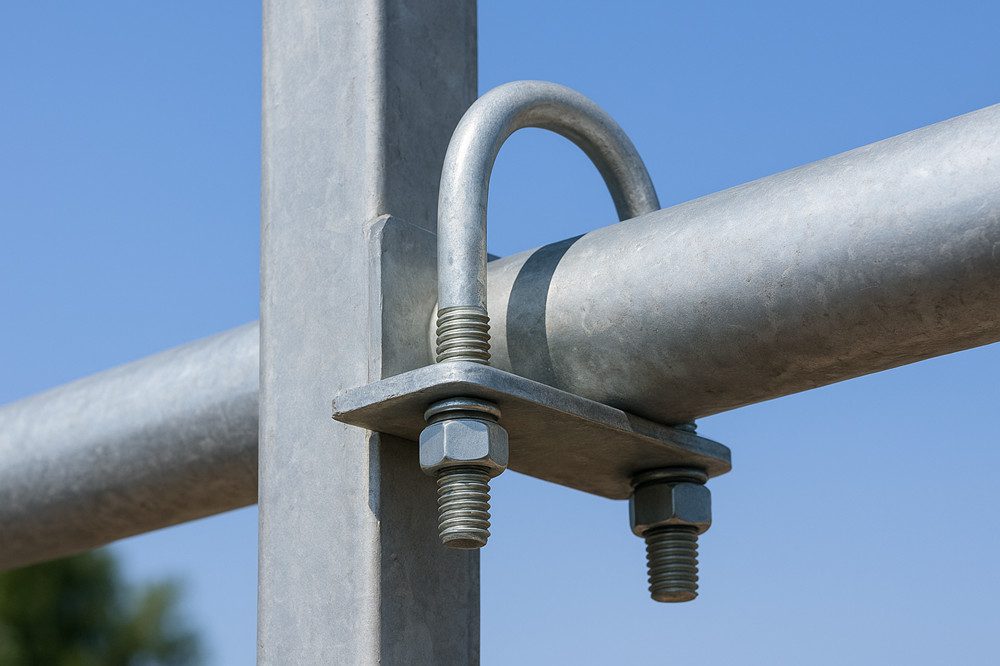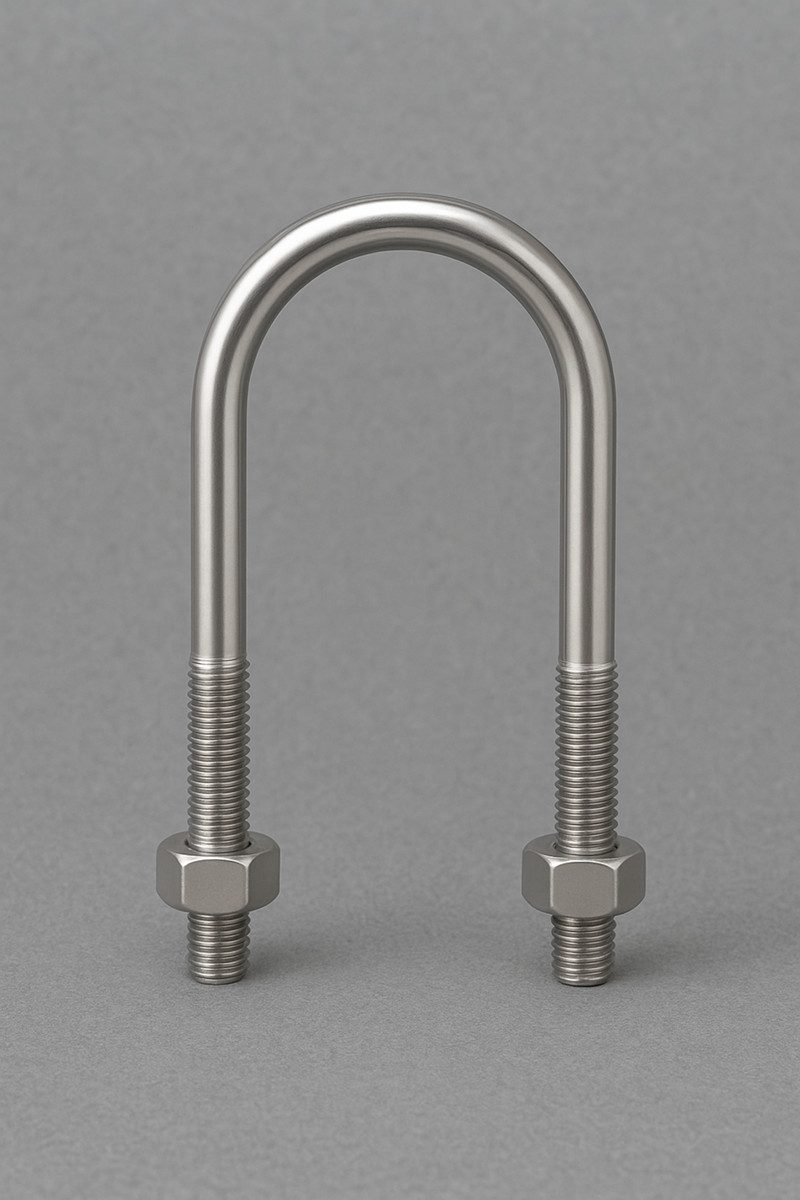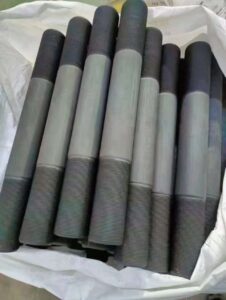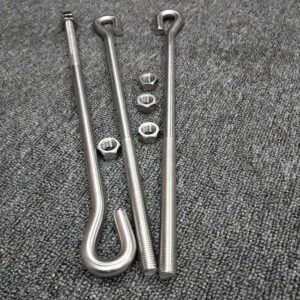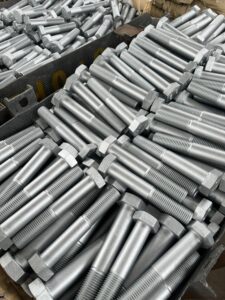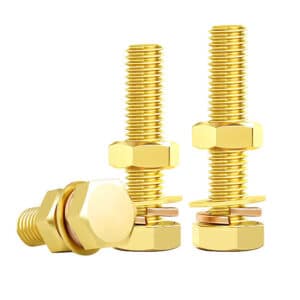In various engineering projects, the U Bolt is a very common fastener. With its “U” shape structure, it securely holds round pipes, steel bars, brackets, pipelines, or cables which make it an nessesory component in pipeline supports, building structures, and machinery installations.
However, when it comes to material selection, many engineers often face a question: Should I choose galvanized U bolts or stainless steel U bolts? Both look similar and serve the same function, but they differ greatly in performance, cost, and suitable environments. I’m Annie, a sales specialist with 15 years experience in the fastener industry. Today, I’ll help you deeply understand how to correctly choose between stainless steel and galvanized U bolts for different applications.
1. In Which Industries Are U Bolts Used?
U bolts have extremely wide applications basically in all industries involving pipe support and connection. Common industries include:
Construction and structural engineering: used to fix steel structures, ventilation ducts, and cable trays.
Machinery installation: for securing motors, pumps, frames, and shafts.
Petrochemical industry: to fix oil and gas pipelines, pressure vessels, etc.
Automotive and transportation: used in chassis, frames, and suspension systems to fasten tubes or beams.
Power and communication: supports power poles, optical cable pipelines, and signal tower components.
Marine and offshore engineering: applied in deck structures, railings, pipelines, and offshore facilities.
Each industry has different performance requirements for U bolts, which is exactly why material selection is so important.
2. Galvanized U Bolts VS Stainless Steel U Bolts — What’s the Difference?
Galvanized U Bolts
The base material of galvanized U bolts is usually carbon steel (such as Q235B), which itself is not corrosion resistant. Its rust resistance comes from a protective zinc coating, formed by electro galvanizing or hot dip galvanizing.The zinc layer effectively prevents oxidation of the metal surface, extending its lifespan at a relatively low cost.
Stainless Steel U Bolts
Stainless steel U bolts are usually made of SUS304, SUS316, or 316L.The biggest advantage of stainless steel lies in its alloy composition containing more than 10.5% chromium. When exposed to oxygen, chromium forms a very thin and dense passive film (mainly chromium oxide) on the surface. This film adheres tightly to the metal, isolating it from air and moisture, preventing rust formation. Even if the surface is scratched, the film can self heal in the presence of oxygen. Therefore, in corrosive environments, outdoor exposure, or marine areas, stainless steel U bolts significantly extend service life.
3. Comparison Table: Galvanized vs. Stainless Steel U Bolts
| Comparison | Galvanized U Bolts | Stainless Steel UBolts | Recommendation |
|---|---|---|---|
| Corrosion Resistance | Good, lifespan depends on zinc layer thickness; not suitable for high salt or chemical environments | Excellent, especially 316 stainless steel resists chloride corrosion | Choose stainless steel for coastal or chemical environments; galvanized is more economical for general use |
| Mechanical Strength | High strength carbon steel base, available in Grade 8.8 or 10.9 | Slightly lower strength, typically A2-70 grade | For heavy duty applications (vehicles, supports), choose galvanized |
| Cost | Economical option, about 1/2 to 1/3 the price of stainless steel | Higher cost due to alloying elements | Choose galvanized for bulk orders or limited budgets |
| Appearance | Silver gray with zinc pattern, may dull over time | Bright and clean, ideal for exposed or visible structures | Choose stainless steel for aesthetic or hygienic environments |
| High Temperature Resistance | Poor — zinc coating loses protection above 200°C | Excellent — withstands up to 800°C | Stainless steel is required for high temperature environments |
4. FAQs: How to Choose?
Based on the above comparison, following below questions,I believe you will make the correct decision :
1.Is the environment humid, salty, or chemically aggressive?
For coastal areas, chemical plants, swimming pools, or contact with deicing salt and chemicals ,please choose stainless steel U bolts.
For the harshest marine environments, we strongly recommend you to use 316 stainless steel.
2.Is the working temperature continuously above 200°C?
If yes, you must use stainless steel U bolts.
3.Is high load bearing strength required (such as heavy equipment suspension or vehicle chassis)?
If yes, please choose galvanized U bolts with high tensile grade ,they can provide excellent strength and corrosion resistance.
4.Is appearance a priority?
For visible installations or cleanroom environments, choose stainless steel U bolts for their bright, clean surface.
5.Is the project budget limited or requires bulk quantities?
Galvanized U bolts are a cost effective option and can still provide reliable protection for decades in normal environments.

